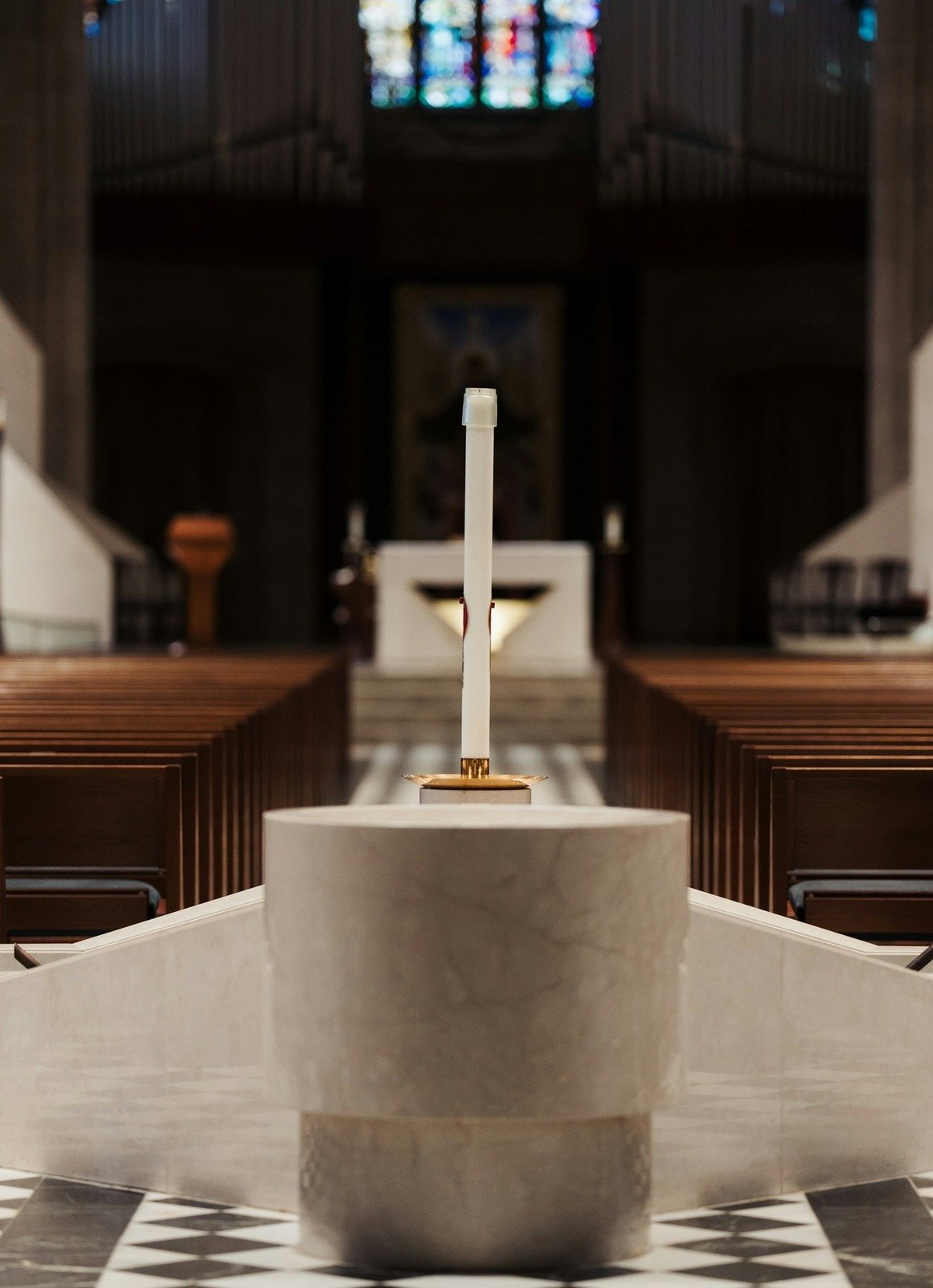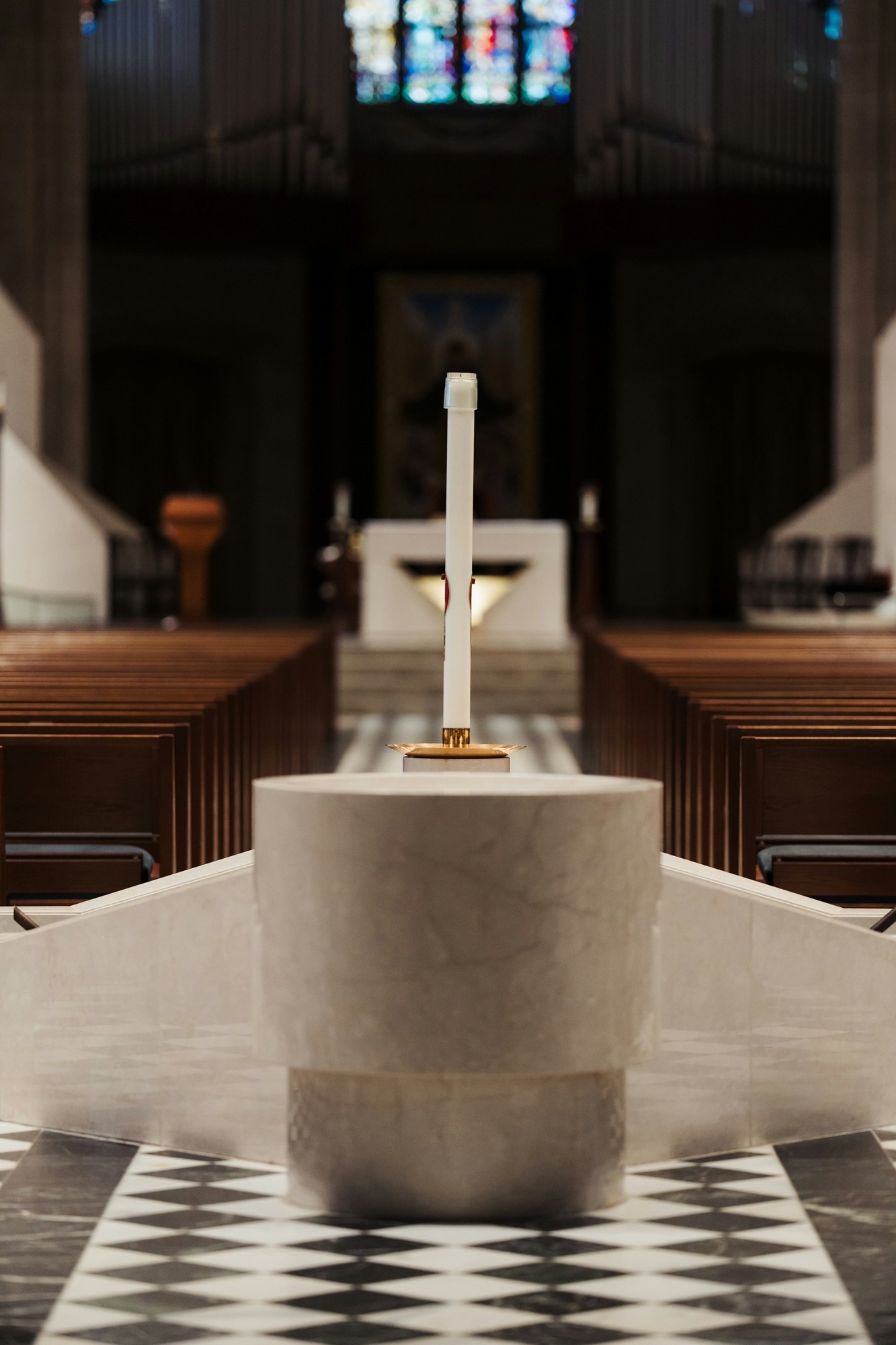-
Contact Us
-
Peggy Popkeyppopkeystalberthouston.orgDirector of Religious Education (DRE)
-
 Margarita Alvaradoyouthstalberthouston.orgYouth Coordinator
Margarita Alvaradoyouthstalberthouston.orgYouth Coordinator
-
-
Order of Christian Initiation of Adults (OCIA)
 Photo by G + L on UnsplashHow does an unbaptized person become Catholic?How does a person baptized in another Christian denomination enter the Catholic Church?
Photo by G + L on UnsplashHow does an unbaptized person become Catholic?How does a person baptized in another Christian denomination enter the Catholic Church?
The Order of Christian Initiation for Adults, previously known as the Rite of Christian Initiation for Adults or the Catechumenate, is the process through which unbaptized persons age seven or older enter the Catholic Faith. It is also the process through which persons baptized in another Christian tradition enter the Catholic Church. Uncatechized Catholics, baptized as infants, who need the sacraments of Confirmation and Eucharist, also complete their formation through the OCIA.
The OCIA is a process of different periods with special rites marking each period. Most of the rites have a proper place within the Sunday Liturgy. The first period is the pre-catechumenate. It is a time of evangelization and fostering of first faith. It is informal and designed to give inquirers a safe place to hear the Good News of Jesus Christ, learn the basics of the Catholic Church, and experience the first stirrings of faith and desire. This period lasts three months to a year, or more, depending on the individual.
The Rite of Acceptance (for the unbaptized) and The Rite of Welcoming (for the baptized) mark the transition from the first to the second period of the OCIA. The second period, called the Catechumenate, is more formal and structured, focusing on Catholic doctrine, belief, and lifestyle, supported by the Sunday readings as experienced in the Breaking Open of the Word. At St. Albert of Trapani, the Breaking Open of the Word takes place at the Sunday Eucharist (9:00 a.m. Mass of the Catechumens), with dismissal after the homily. The Catechumenate demands the following criteria:- A suitable catechesis, gradual but complete, accommodated to the liturgical year and solidly supported by celebrations of the Word,
- Support by the sponsors and the entire Christian community, as the candidates enter into the life of the Church,
- Participation in suitable liturgical rites, which purify gradually and strengthen the catechumens with God’s blessing,
- Apostolic service and personal witness which builds up the Church
- The period of the Catechumenate should last at least one liturgical year.
The Rite of Election marks the conclusion of the period of the Catechumenate and the beginning of the Period of Purification and Enlightenment. This rite marks the end of catechesis and begins the period of deep reflection and scrutiny. For the unbaptized, three scrutinies are celebrated. The scrutinies are meant to reveal all that is weak and sinful, everything that is blind and in denial, and everything that is bound or dying. The scrutinies also build up all that is strong and good. The baptized candidates take part in the scrutinies with the unbaptized or celebrate a penitential rite on their own.
The Order of Christian Initiation is the work of the whole parish. The formal ministers of the OCIA are the Priests, Deacons, Liturgists, and the OCIA Director. Other ministers include the team members (catechists), sponsors, godparents, and the whole assembly, who pray for and support those desiring to enter the Catholic Church.
Sponsors and team members are needed to fulfill the ministry of the OCIA. For more information, call and leave a message or text Rey Sanguyo at 832-231-0799. -
Order of Christian Initiation for Children (OCIC)
 Photo by G + L on UnsplashThis program is for any child or teenager who is 7 years old or older and has not yet been baptized.
Photo by G + L on UnsplashThis program is for any child or teenager who is 7 years old or older and has not yet been baptized.
Upon completing this program, the child or teen will receive the Sacraments of Baptism, First Communion, and Confirmation (if applicable).- Must bring a copy of the child/teen's birth certificate
- Days for classes will be communicated
- More information regarding the start date will be given to you at the time of registration
-
Orden de Iniciación Cristiana de Adultos (OCIA)
 Photo by G + L on Unsplash¿Cómo se convierte al catolicismo una persona no bautizada? ¿Cómo ingresa a la Iglesia Católica una persona bautizada en otra denominación cristiana?
Photo by G + L on Unsplash¿Cómo se convierte al catolicismo una persona no bautizada? ¿Cómo ingresa a la Iglesia Católica una persona bautizada en otra denominación cristiana?
El Orden de Iniciación Cristiana para Adultos, anteriormente conocido como Rito de Iniciación Cristiana para Adultos o Catecumenado, es el proceso mediante el cual las personas no bautizadas de siete años o más se incorporan a la fe católica. También es el proceso mediante el cual las personas bautizadas en otra tradición cristiana se incorporan a la Iglesia Católica. Los católicos no catequizados, bautizados en la infancia, que necesitan los sacramentos de la Confirmación y la Eucaristía, también completan su formación a través del Orden de Iniciación Cristiana para Adultos (OCIA).
El Orden de Iniciación Cristiana para Adultos (OCIA) es un proceso de diferentes períodos, con ritos especiales que marcan cada uno. La mayoría de los ritos tienen un lugar propio en la liturgia dominical. El primer período es el precatecumenado, un tiempo de evangelización y de fomento de la primera fe. Es informal y está diseñado para brindar a quienes buscan un espacio seguro para escuchar la Buena Nueva de Jesucristo, aprender los fundamentos de la Iglesia Católica y experimentar los primeros indicios de fe y deseo. Este período dura de tres meses a un año, o más, dependiendo de la persona.
El Rito de Aceptación (para los no bautizados) y el Rito de Bienvenida (para los bautizados) marcan la transición del primer al segundo período de la OCIA. El segundo período, llamado Catecumenado, es más formal y estructurado, y se centra en la doctrina, las creencias y el estilo de vida católicos, con el apoyo de las lecturas dominicales, tal como se experimenta en la Proclamación de la Palabra. En San Alberto de Trápani, la Proclamación de la Palabra tiene lugar durante la Eucaristía dominical (Misa de los Catecúmenos a las 9:00 a. m.), con la despedida después de la homilía. El catecumenado exige los siguientes criterios:- Una catequesis adecuada, gradual pero completa, adaptada al año litúrgico y sólidamente sustentada por las celebraciones de la Palabra;
- Apoyo de los padrinos y de toda la comunidad cristiana, a medida que los candidatos se integran en la vida de la Iglesia;
- Participación en ritos litúrgicos adecuados, que purifican gradualmente y fortalecen a los catecúmenos con la bendición de Dios;
- Servicio apostólico y testimonio personal que edifica la Iglesia;
- El período del catecumenado debe durar al menos un año litúrgico.
El Rito de Elección marca la conclusión del período del catecumenado y el inicio del período de purificación e iluminación. Este rito marca el final de la catequesis y el inicio del período de profunda reflexión y escrutinio. Para los no bautizados, se celebran tres escrutinios. Los escrutinios tienen como objetivo revelar todo lo que es débil y pecaminoso, todo lo que está ciego y en negación, y todo lo que está atado o moribundo. Los escrutinios también fortalecen todo lo bueno y fuerte. Los candidatos bautizados participan en los escrutinios con los no bautizados o celebran un rito penitencial individualmente.
El Orden de Iniciación Cristiana es obra de toda la parroquia. Los ministros formales de la OCIA son los sacerdotes, diáconos, liturgistas y el director de la OCIA. Otros ministros incluyen a los miembros del equipo (catequistas), padrinos, madrinas y toda la asamblea, quienes oran y apoyan a quienes desean ingresar a la Iglesia Católica.
Se necesitan padrinos y madrinas para cumplir con el ministerio de la OCIA. Para más información, llame y deje un mensaje o envíe un mensaje de texto a Rey Sanguyo al 832-231-0799. -
Orden de Iniciación Cristiana para Niños (OCIC)
 Photo by G + L on UnsplashEste programa es para niños y adolescentes de 7 años o más que aún no hayan sido bautizados.
Photo by G + L on UnsplashEste programa es para niños y adolescentes de 7 años o más que aún no hayan sido bautizados.
Al completar este programa, recibirán los sacramentos de Bautismo, Primera Comunión y Confirmación (si corresponde).- Deben traer una copia de su acta de nacimiento.
- Se les comunicarán los días de las clases.
- Se les proporcionará más información sobre la fecha de inicio al momento de la inscripción.